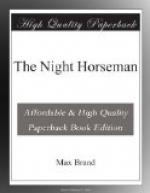His ear, subconsciously attentive to everything around him, caught a faint sound from the next room. It was a regular noise. It had the rhythm of a quick footfall, but in its nature it was more like the sound of a heavily beating pulse. Randall Byrne sat up in his chair. A faint creaking attested that it was, indeed, a footfall traversing the room to and fro, steadily.
The stranger, then, no longer leaned over the couch of the old cattleman. He was walking up and down the floor with that characteristic, softly padding step. Of what did he think as he walked? It carried Byrne automatically out into the darkest night, with a wind in his face, and the rhythm of a long striding horse carrying him on to a destination unknown.
Here he heard a soft scratching, repeated, at the door. When it came again he rose and opened the door—at once the tall, shaggy dog slipped through the opening and glided past him. It startled Byrne oddly to see the animal stealing away, as if Barry himself had been leaving. He called to the beast, but he was met by a silent baring of white fangs that stopped him in his tracks. The great dog was gone without a sound, and Byrne closed the door again without casting a look inside. He was stupidly, foolishly afraid to look within.
After that the silence had a more vital meaning. No pictures crowded his brain. He was simply keyed to a high point of expectancy, and therefore, when the door was opened silently, he sprang up as if in acknowledgment of an alarm and faced Barry. The latter closed the door behind him and glided after the big dog. He had almost crossed the big room when Byrne was able to speak.
“Mr. Barry!” he called.
The man hesitated.
“Mr. Barry,” he repeated.
And Dan Barry turned. It was something like the act of the wolf the moment before; a swift movement—a flash of the eyes in something like defiance.
“Mr. Barry, are you leaving us?”
“I’m going outside.”
“Are you coming back?”
“I dunno.”
A great joy swelled in the throat of Doctor Byrne. He felt like shouting in triumph; yet he remembered once more how the girl had gone up the stairs, wearily, with fallen head. He decided that he would do what he could to keep the stranger with them, and though Randall Byrne lived to be a hundred he would never do a finer thing than what he attempted then. He stepped across the room and stood before Barry, blocking the way.
“Sir,” he said gravely, “if you go now, you will work a great sorrow in this house.”
A glint of anger rose in the eyes of Barry.
“Joe Cumberland is sleepin’ soun’,” he answered. “He’ll be a pile rested when he wakes up. He don’t need me no more.”
“He’s not the only one who needs you,” said Byrne. “His daughter has been waiting impatiently for your coming, sir.”
The sharp glance of Barry wavered away.




